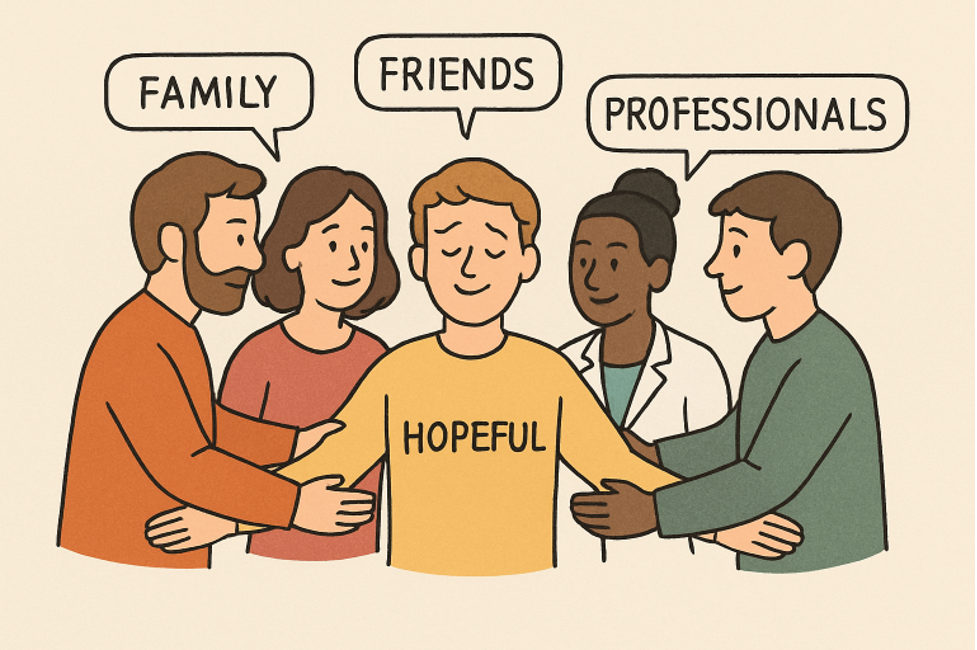Embarking on the path to recovery from addiction is a formidable challenge, yet the presence of a robust support system can significantly enhance the journey. When individuals seeking sobriety leverage support networks—comprising family, friends, peers, and professionals—they not only find encouragement but also gain vital resources for long-term success. For those looking for more information on recovery resources and support, dedicated facilities offer guidance suited to each unique experience.
Support networks provide emotional, social, and practical assistance crucial for sustained sobriety. Whether attending group sessions or reaching out through digital platforms, these networks are often the linchpin that transforms a challenging recovery into a sustainable, hopeful journey.
Emotional Support
Recovery from addiction involves navigating a complex emotional landscape. Emotional support from loved ones forms a foundation of empathy and encouragement when challenges arise. When supportive family members and friends actively listen and express understanding, individuals in recovery are less likely to feel isolated or overwhelmed. This genuine concern fosters trust and gives the recovering person validation, confidence, and hope. Knowing someone is there to celebrate achievements and offer comfort during setbacks is invaluable for mental well-being and resilience.
Social Support
Rebuilding a positive social network is often a crucial first step after treatment. Participation in support groups such as Alcoholics Anonymous (AA) or Narcotics Anonymous (NA) helps foster connections with people facing similar challenges. In these groups, members share stories, offer advice, and provide the accountability necessary for growth. The sense of fellowship they offer is proven to reduce relapse rates and improve long-term recovery outcomes. Group meetings reinforce a sense of belonging, which is integral to rebuilding a healthy, substance-free lifestyle.
Professional Support
Professional assistance from trained therapists, counselors, and medical staff is at the core of a comprehensive recovery plan. These experts employ evidence-based therapies tailored to individual backgrounds and needs, addressing both the symptoms of addiction and any underlying trauma or co-occurring mental health issues. Clinical guidance from professionals ensures that coping mechanisms and relapse prevention strategies are both effective and sustainable. In addition, professional support helps manage medication-assisted treatment when needed and facilitates transitions from intensive care to more independent recovery phases. Reliable access to specialized care can make a profound difference in avoiding setbacks and promoting healing.
Peer Support
Those who have successfully navigated their recovery journeys can offer unmatched motivation and insight. Peer support specialists draw on personal experience, providing mentorship and inspiration to others facing similar obstacles. Their real-life perspective helps break down stigma, promotes acceptance, and offers strategies that have been proven to work. The encouragement of a peer who has “been there” can instill hope and normalize the setbacks that are often part of the journey. Peer-led meetings and one-on-one support are powerful in fostering accountability, motivation, and healthy coping skills.
Community Involvement
Beyond close relationships and formal support groups, community engagement offers growth opportunities during every stage of recovery. Local organizations, recreational activities, and volunteer projects provide positive outlets for time and energy that might otherwise be spent relapsing. Participation in community resources increases self-esteem, fosters new friendships, and adds meaning to everyday life. Community-driven initiatives often include health screenings, educational seminars, workshops, and sober social events, creating environments that reinforce healthy living and commitment to sobriety.

Digital Support Platforms
Technology has made support more accessible than ever. Online platforms, discussion forums, and virtual support groups offer connection anytime and anywhere, broadening a sense of community for those separated by distance or circumstance. Digital support options provide anonymity, comforting individuals hesitant to engage in person. 24/7 access to resources, chatrooms, and meetings means help is available when needed most. These platforms are also adaptable, allowing people to find groups or mentors closely aligned with their recovery paths or specific needs.
Family Involvement
Family dynamics profoundly influence the recovery process. Rebuilding trust and open communication within the household helps resolve long-standing issues and creates a nurturing environment centered on health. Family therapy is often key to addressing codependency and enabling behaviors, providing all family members with the skills and knowledge needed for supportive coexistence. A healthy home life can decrease loneliness and frustration, two triggers that often lead to relapse. Parents, siblings, or partners participating actively in recovery are more likely to create a support network beyond formal treatment.
Building a Personalized Support System
Recovery isn’t one-size-fits-all. Building a reliable, responsive support network tailored to individual needs requires self-reflection and openness to a mix of resources. This may include creating structured plans that blend family, peer, professional, and community connections. Regularly assessing what works ensures the network adapts as new challenges arise or support needs evolve. Personalizing a support system in this way increases the likelihood of maintaining sobriety and achieving life goals.
In conclusion, a strong support system is the cornerstone of successful recovery. By engaging with diverse support networks—emotional, social, professional, and digital—individuals are better equipped to navigate the complexities of addiction recovery and build lasting, positive change.




